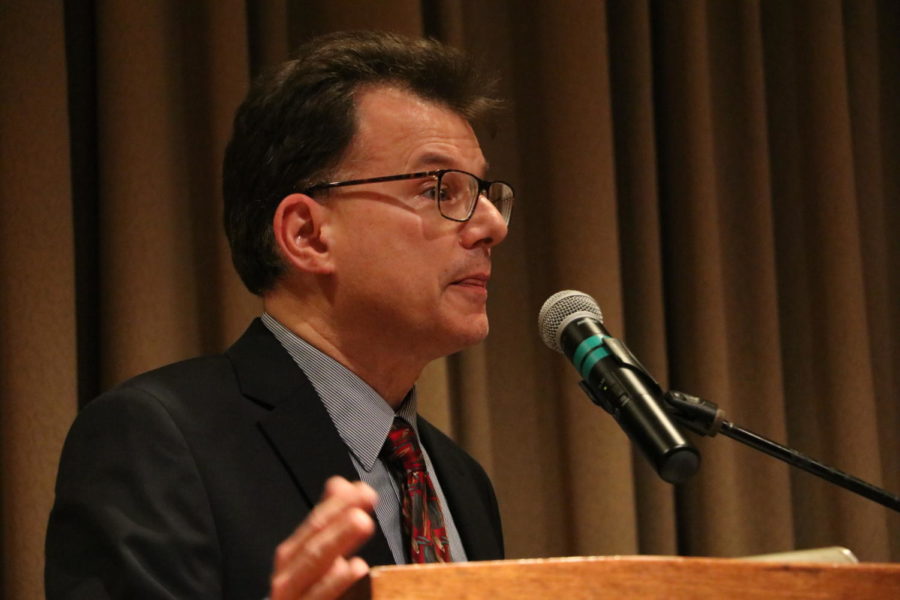- App Content
- App Content / News
- News
- News / Politics And Administration / Campus
- News / Politics And Administration / City
- News / Politics And Administration / State
- News / State
- News / Student Life
Discussion on Muslim student rights held
Chris Jorgensen/Iowa State Daily
Clark Wolf, Iowa State professor in philosophy and political science, moderated the discussion at the ‘Know Your Rights’ forum.
January 23, 2017
“What are your rights?,” a discussion on the legal rights of Muslim students at Iowa State, was hosted in the Memorial Union Monday night.
Prior to the start of Monday night’s discussion, Humza Malik, president of the Muslim Student Association, arrived at the Sun Room in order to prepare for the forum and the introduction he would give for the event.
Malik said that many of the Muslim international students have expressed concern for how they will be treated and have been treated. Besides presenting information about the guest speakers, and the American Civil Liberties Union (ACLU) and Council of American Islamic Relations (CAIR), Malik believed the conversation could provide answers and guidance to those students.
“This is more of an information session for them,” Malik said. “Half of it is going to be talking about what they [the guest speakers] do and their experiences and then the other half of the conversation will be centered towards any questions anyone has.”
At the beginning of the discussion, Malik welcomed the conversation moderator Dr. Clark Wolf, director of bioethics and professor of philosophy at Iowa State University, to speak.
Wolf gave a brief introduction for each of the guest speakers that would be presenting: ACLU of Iowa Legal Director Rita Bettis and the head of the (CAIR) department to monitor and combat Islamophobia, Corey Saylor.
He also stated that the Ames Police Chief Chuck Cychosz would be present during the question and answer portion to answer any questions about what the Ames community is doing to combat Islamophobia.
The informative portion of the discussion began by Bettis taking over the mic and presenting about Muslim rights and the processes involved in combating anti-Muslim discrimination. What ensued was an educational display of the constitutional rights guaranteed to Muslims in America and an analysis of the unconstitutional proposed acts or laws that have recently been theorized.
“The ACLU has long sought a country, and an Iowa, where religious liberty and equality under the law are assured,” Bettis said. “At the ACLU, we know that our country has yet to fulfill its foundational promise to be free and equal for all. Since the days following 9/11, the ACLU has prioritized work to combat anti-Muslim discrimination.”
She said there has been discriminatory and disrespectful rhetoric in the last presidential election, and such rhetoric has been used by the current president.
“I want to walk you through exactly why his specific anti-Muslim proposals, if ever enacted, and we would fight that, would violate the constitution and laws of our country,” Bettis said.
With that information she also included “Know Your Rights” information such as the rights Muslims, and people of any religious orientation, have to wear any religious garb of his or her choice.She brought up many fact based points to disclaim previous proposals from President-elect Donald Trump.
“Profiling American Muslims would violate the first and fifth amendments,” Bettis said. “The U.S. constitution guarantees equal protection of the laws and any federal law or policy that treats Muslims differently on the basis of religion, as Trump has proposed, would be unconstitutional.”
Much of this information is attainable on the ACLU website.
“The most important message that I have for everyone here today is that our constitution is bigger, stronger, and more resilient than even the president, even congress or any law that they will pass,” Bettis said. “We will use all the tools that we have available to us to oppose any of the harmful proposals.”
Corey Saylor followed Bettis with words od reassurance.
“The election was three months ago,” Saylor said. “Relax, it’s cool, we’re going to be all right. The constitution is bigger than any of this.”
He also spoke on the rights of the Muslims in America and how they are protected by the constitution. Saylor stressed the importance of standing up for the rights of those in the community and becoming more involved in making a difference.
This importance was only stressed as the Q&A portion began. A serious tone fell over the audience of about 100 Ames community members when the reality of the concern of those directly affected by Islamophobia was heard and many Muslims attending the discussion expressed their fears about their rights being in jeopardy.
The guest speakers, as well as the members of the Ames police department, answered the questions hoping to reassure the members of the community that they are safe.






